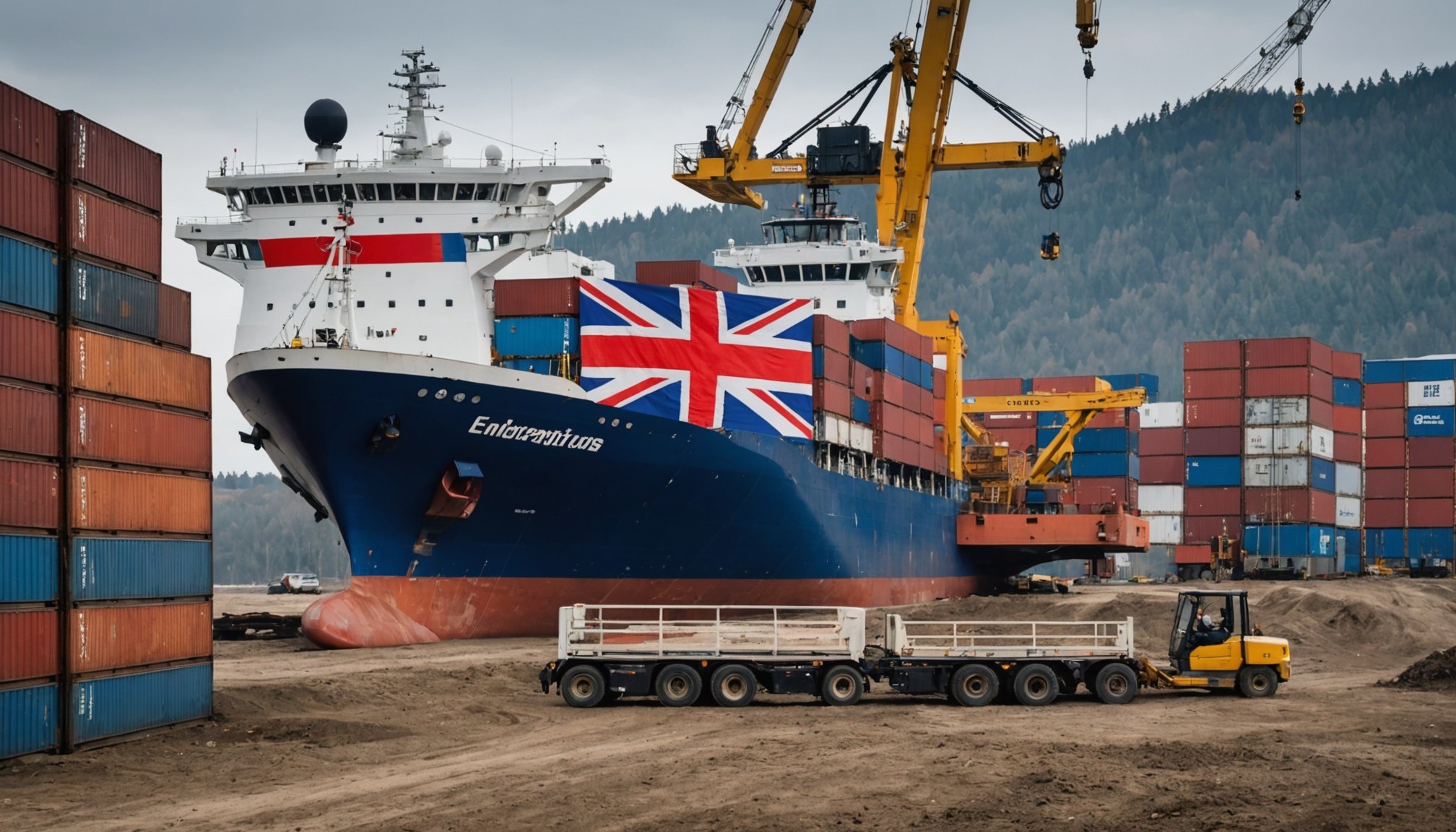Legal Requirements for Partnering with Third-Party Logistics in the UK
Navigating legal requirements is crucial for UK companies considering partnerships with third-party logistics providers. Understanding the framework of shipping regulations is essential to ensure compliance and avoid potential pitfalls.
In the UK, businesses must adhere to specific compliance measures when engaging third-party logistics services. These include conforming to trade and customs regulations, which govern the import and export processes, ensuring goods’ safety and security.
Topic to read : Unlocking Blockchain: Legal Considerations for UK Companies in Supply Chain Management
Additionally, compliance with international shipping standards, such as customs documentation and labelling requirements, is vital. These standards not only facilitate smooth operations but also prevent legal issues during cross-border transactions.
Failure to comply with these legal requirements can result in severe consequences, including fines, shipment delays, and reputational damage. Companies must, therefore, prioritise risk management by regularly updating their knowledge of evolving shipping regulations.
Also to see : Understanding the Legal Landscape: Impacts of Third-Party Cookie Tracking on UK Businesses
To manage such risks, partnering with logistics providers experienced in navigating these complex legal requirements is advantageous. Such partnerships guide businesses through compliance processes, ensuring seamless and lawful international shipping activities.
Contracts with Third-Party Logistics Providers
Engaging with a third-party logistics (3PL) provider involves drafting a comprehensive contract that clearly outlines the expectations and responsibilities of all parties involved. This contract not only ensures a mutual understanding but also safeguards interests in the supply chain context.
Essential Components of 3PL Contracts
A well-structured agreement will typically include several critical components to ensure its effectiveness. These components often cover obligations, responsibilities, and performance expectations from both parties. Clearly defined roles help avoid confusion and set a solid foundation for a successful partnership. Moreover, financial terms such as payment schedules, pricing adjustments, and renewal options are critical areas that need precise definition.
Negotiating Terms and Conditions
When negotiating terms, it’s essential to focus on aligning them with the logistics goals and capabilities of both parties. Effective negotiation ensures that all stipulations, like service scope and delivery timings, are realistic and beneficial. This stage also bears the opportunity to incorporate flexibility for any unforeseen supply chain disruptions.
Understanding Service Level Agreements (SLAs)
SLAs form a pivotal section in 3PL contracts, as they set the metric for service evaluation. Detailed SLAs highlight the responsibilities, including inventory management, delivery benchmarks, and the quality of service expected. Moreover, it is vital to specify penalties for service failures and establish dispute resolution clauses that mitigate conflict and encourage collaborative problem-solving.
Liability Issues in Global Shipping
Understanding liability in global shipping is crucial for all parties involved in international trade. Liability limits in transportation dictate the extent to which a carrier is responsible for goods during transit. These limits can often depend on various factors like the mode of transport and applicable laws. For example, international conventions set different parameters for air, sea, and land transport, affecting the risk distribution among stakeholders.
One essential component that influences liability is Incoterms (International Commercial Terms). They are standardised terms defining responsibilities and liabilities between buyers and sellers. Depending on the chosen Incoterm, liability and risk may shift at different stages of the shipping process. Thus, choosing the right Incoterm is vital for mitigating risks and ensuring clarity in transactions.
With liability limits and Incoterms in mind, comprehensive insurance coverage becomes indispensable. Insurance protects against unforeseen events that can lead to financial loss. It covers areas where liability limits fall short, offering peace of mind to businesses engaged in global shipments. A properly managed insurance policy ensures that even if an unfortunate event occurs, both financial and operational impacts are minimised.
Customs Regulations and Compliance
Navigating customs regulations is crucial for successful international shipping. In the UK, businesses must adhere to a set of specific guidelines to ensure compliance. A pivotal step in this process is the accurate preparation and submission of the right documentation.
Common documentation includes the Commercial Invoice, which details the value and nature of goods. The Packing List, highlighting the packaging specifics, and a Bill of Lading, serving as a transport contract, are equally vital. Accurate documentation not only facilitates smoother customs clearance but also guards against potential legal issues.
Non-compliance can result in significant penalties. Violating customs regulations might lead to fines or seizures of goods, delaying shipments, and incurring extra costs. For businesses, understanding each regulation’s intricacies and maintaining thorough records is imperative for safeguarding operations.
Moreover, businesses should stay updated on regulatory changes to avoid unintentional violations. Through diligent compliance and comprehensive understanding of customs regulations, businesses can minimise risks and ensure seamless international transactions. These measures build trust with international partners and enhance operational efficiency.
Tax Implications for International Logistics
Navigating tax implications in international logistics requires understanding key elements like Value Added Tax (VAT) and import duties. These factors significantly influence costs and operational strategies.
VAT is a consumption tax levied on the added value of goods at each stage of production and distribution. It is crucial in logistics, affecting pricing and profitability. Companies must accurately calculate VAT to ensure compliance and manage finances effectively.
Import duties, on the other hand, are taxes imposed on goods entering a country. These duties vary based on the product type, origin, and destination. Import duties increase shipping costs considerably, impacting a company’s budgeting and pricing strategies. Recognising the specifics of these duties can help businesses plan and allocate resources efficiently.
To manage tax liabilities efficiently, companies can employ several strategies. First, they should stay updated on global tax regulations to avoid unforeseen expenses. Utilising customs brokers or tax advisors can assist in understanding complex tax frameworks. Additionally, leveraging free trade agreements and exploring bonded warehouses can further optimise tax management, potentially reducing overall costs and enhancing competitiveness in international markets. Thus, understanding and strategically managing VAT and duties can significantly improve a company’s financial health.
Case Studies on Legal Considerations in 3PL Partnerships
Exploring real-world examples through case studies offers invaluable insights into the best practices for managing legal aspects in third-party logistics (3PL) partnerships. A successful partnership hinges not only on operational efficiency but also on rigorous adherence to legal frameworks.
Successful Partnerships and Legal Compliance
In one notable case, a logistics company partnered with a 3PL provider, ensuring legal compliance through meticulous contract drafting and periodic legal audits. The company integrated a strong in-house legal team to work with external counsel, showcasing the importance of building strong relationships with legal counsel. This strategy not only safeguarded against potential legal pitfalls but also enhanced operational trust and efficiency.
Lessons from Legal Disputes in Logistics
Conversely, a 3PL partnership soured due to a lack of thorough due diligence, leading to significant legal disputes over non-compliance. This situation underscored the necessity for initial and ongoing legal evaluations to anticipate and prevent future issues.
Best Practices for Mitigating Legal Risks
To mitigate legal risks, businesses should:
- Conduct comprehensive due diligence.
- Establish robust communication with legal advisors.
- Regularly review contracts and ensure compliance with updated regulations.
Such practices not only fortify legal compliance but also foster more resilient partnerships in the logistics sector.






